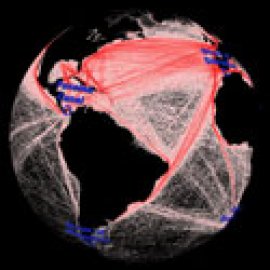Unmanned War at Sea
-
English
-
ListenPause
[intro music, ocean sounds]
Welcome to World Ocean Radio…
I’m Peter Neill, Director of the World Ocean Observatory.
As with all things, the face of warfare is changing. Headlines from the Ukraine reveal the new strategic efficiencies of drones, a new type of weapon that is far cheaper, unmanned, and more versatile on attack to an extent that the conventions of war, including the so-called rules for military operations, are in immediate need of re-evaluation and change. The use of remotely operated aircraft and ground vehicles is proving astonishingly effective, and the technology is quickly being adapted to surface and subsurface vessels for war at sea.
There are various international treaties and agreements that pertain: the UN Convention of the Law of the Sea, the Vienna Convention of the Law of Treaties, the definitions of the UN International Maritime Organization, the International Convention for the Prevention of Pollution from Ships, the Convention for the International Regulations for Preventing Collisions at Sea, and others that all establish various characteristics and definitions of what constitutes a “ship:” to include, bearing the external marks of the possessing flag state, under the command by an officer and manned by a crew—each instance of which requires much new legal consideration and interpretation when the vessel is remotely operated, without crew, and apparently invisible.
In this new world, the nuances of control matter, whether by the hand of an officer or an algorithm, and attempts to categorize responsibility, accountability, and yes, moral justification, under such novel criteria raise new issues and questions for any attempt to order the rules in what is a fundamental condition of conflict, irresolution, and disorder. Who, for example, decides and deploys the autonomous vessel? Who is responsible for unforeseen consequence, including civilian collateral damage or environmental destruction? What is the difference, as an act of war, between lethal and non-lethal intrusion in enemy space on land or sea? What are the rules when targets are outside accepted territorial limits, on offense or defense, or with unarticulated, ambiguous purpose? What degree of “awareness” distinguishes whether the vessel is an instrument of discipline or indiscriminate intent? How do you determine the authority for response to a vessel without apparent nationality, thus without enforceable jurisdiction? Who goes there?
We have seen the effects of unmanned vehicles, be they military drones or research science submersibles. We have seen these instruments at sea as observing and collecting platforms for bottom sampling, meteorological data collection, sonar mapping, current direction and tidal change, sediment studies, heat distribution, salinity variations, distribution of pollutants and toxins, and more. We have seen unmanned vehicles identify, isolate, and attack warships, in the Baltic Sea for example, where Ukrainian drones have forced Russia’s fleet to re-deploy, removed from the calculus of naval deterrence and advantage, a serious re-calculation of force and conquest in a theater much too close to home.
History has its examples of extra-legal ocean vessels—from privateers to coastal pirates to offshore radio stations broadcasting the turpitude of rock-and-roll. The various treaties and agreements to date have attempted to control these through systematic codes, regulation, and legitimized enforcement. But, as with most things, technology has shifted the conversation, from measurable legality to amorphous irresponsibility. The legislators and law-makers have always struggled to control what is uncontrollable; efforts at a codified certainty limited by jurisdictional ambiguity and courts of no return. War is by definition the upset of a disputed order, where the enactment and enforcement of law is indisputably relative to the self-serving justifications of the parties, and, whether the instrument of war is manned or unmanned, on land or sea, it is as ambiguous and destructive as is its intent.
What would happen if we disqualified the ocean as a place for war? No fleets of geopolitical influence and imperial aspiration in faraway seas; no ship to ship, no ship to shore missiles aboard vessel on coastal patrol; no submarine surveillance and underwater defense; no hostile engagement waterborne for any purpose other than trade and cultural exchange. War at sea is too invisible, too ephemeral, too incompatible with the production and providence the ocean naturally sustains; it has no ultimate effect there, no utility, no meaning, other than another example how we negate and often destroy the things we love and serve us peacefully, so fulsomely, so well.
There ought to be a law.
We will discuss these issues, and more, in future editions of World Ocean Radio.
WORLD OCEAN RADIO IS DISTRIBUTED BY THE PUBLIC RADIO EXCHANGE AND THE PACIFICA NETWORK, FOR USE BY COLLEGE AND COMMUNITY RADIO STATIONS WORLDWIDE. FIND US WHEREVER YOU LISTEN TO PODCASTS, AND AT WORLD OCEAN OBSERVATORY DOT ORG, WHERE THE FULL CATALOG OF MORE THAN 700 RADIO EPISODES IS SEARCHABLE BY THEME.
[outro music, ocean sounds]
The face of war is changing quickly: cheap, unmanned, versatile drones and remotely operated aircraft, coupled with rapidly-advancing technology, satellite communications, ambiguous algorithms, accountability, and responsibility are shifting the shapes of war around the globe, especially as it pertains to the unseen and largely unmonitored high seas. With a world struggling to keep up, the instruments of war are becoming invisible, ephemeral and uncontrollable. What laws are in place to protect the ocean and the natural systems on which life is sustained?
About World Ocean Radio
World Ocean Radio is a weekly series of five-minute audio essays available for syndicated use at no cost by college and community radio stations worldwide. Peter Neill, Director of the World Ocean Observatory and host of World Ocean Radio, provides coverage of a broad spectrum of ocean issues from science and education to advocacy and exemplary projects.
World Ocean Radio
14 Years
730+ Episodes
Ocean is climate
Climate is ocean
The sea connects all things
- Login to post comments



